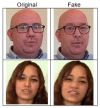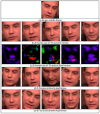Evaluating Features and Variations in Deepfake Videos Using the CoAtNet Model
- PMID: 40558793
- PMCID: PMC12194761
- DOI: 10.3390/jimaging11060194
Evaluating Features and Variations in Deepfake Videos Using the CoAtNet Model
Abstract
Deepfake video detection has emerged as a critical challenge in the realm of artificial intelligence, given its implications for misinformation and digital security. This study evaluates the generalisation capabilities of the CoAtNet model-a hybrid convolution-transformer architecture-for deepfake detection across diverse datasets. Although CoAtNet has shown exceptional performance in several computer vision tasks, its potential for generalisation in cross-dataset scenarios remains underexplored. Thus, in this study, we explore CoAtNet's generalisation ability by conducting an extensive series of experiments with a focus on discovering features and variations in deepfake videos. These experiments involve training the model using various input and processing configurations, followed by evaluating its performance on widely recognised public datasets. To the best of our knowledge, our proposed approach outperforms state-of-the-art models in terms of intra-dataset performance, with an AUC between 81.4% and 99.9%. Our model also achieves outstanding results in cross-dataset evaluations, with an AUC equal to 78%. This study demonstrates that CoAtNet achieves the best AUC for both intra-dataset and cross-dataset deepfake video detection, particularly on Celeb-DF, while also showing strong performance on DFDC.
Keywords: CoAtNet; Generative Adversarial Networks (GANs); computer vision (CV); deepfake; digital multimedia forensics.
Conflict of interest statement
The authors declare no conflicts of interest.
Figures












References
-
- Shelke N.A., Kasana S.S. A comprehensive survey on passive techniques for digital video forgery detection. Multimed. Tools Appl. 2020;80:6247–6310. doi: 10.1007/s11042-020-09974-4. - DOI
-
- Lyu S. Deepfake Detection: Current Challenges and Next Steps; Proceedings of the 2020 IEEE International Conference on Multimedia & Expo Workshops (ICMEW); London, UK. 6–10 July 2020.
-
- Rana S., Sung A.H. DeepfakeStack: A Deep Ensemble-based Learning Technique for Deepfake Detection; Proceedings of the 2020 7th IEEE International Conference on Cyber Security and Cloud Computing (CSCloud)/2020 6th IEEE International Conference on Edge Computing and Scalable Cloud (EdgeCom); New York, NY, USA. 1–3 August 2020; pp. 70–75. - DOI
-
- Tolosana R., Vera-Rodriguez R., Fierrez J., Morales A., Ortega-Garcia J. Deepfakes and beyond: A Survey of face manipulation and fake detection. Inf. Fusion. 2020;64:131–148. doi: 10.1016/j.inffus.2020.06.014. - DOI
-
- Malavida, FakeApp 2.2.0. 2022. [(accessed on 1 March 2022)]. Available online: https://www.malavida.com/en/soft/fakeapp/
Grants and funding
LinkOut - more resources
Full Text Sources
Miscellaneous

